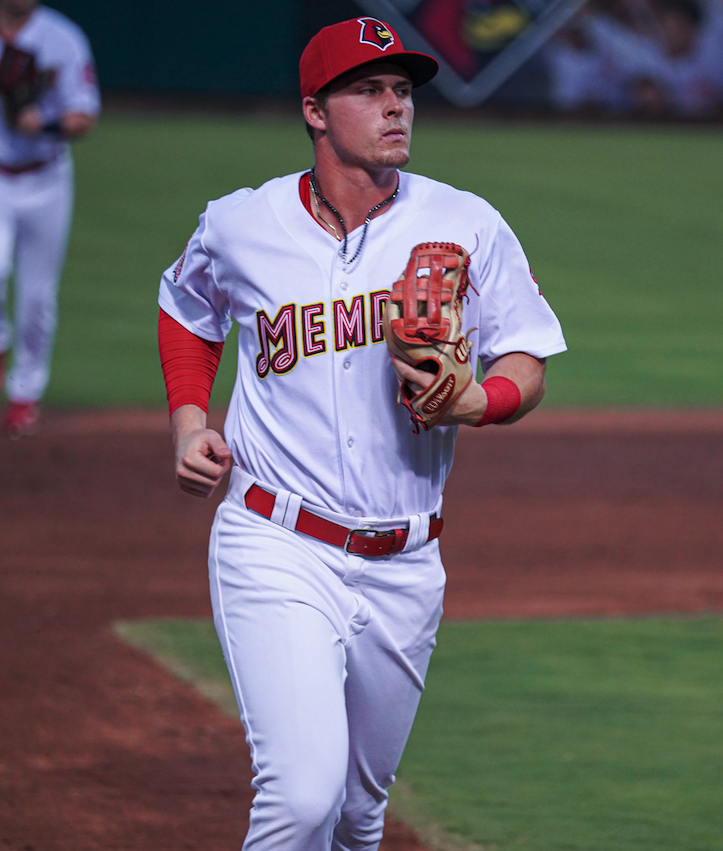When the calendar turned to 2021, Nolan Gorman knew he would spend the year as one of the St. Louis Cardinals’ top two prospects (along with pitcher Matthew Liberatore, a childhood pal from Arizona and now a teammate with the Memphis Redbirds). What Gorman didn’t know was that by February, he would be merely the second-best third baseman named Nolan in the Cardinals’ system.
With the acquisition of perennial All-Star Nolan Arenado from the Colorado Rockies, the Cardinals secured what they hope will be their third baseman for the better part of a decade. They also added a twist to “the other Nolan’s” development. Gorman now spends most nights playing second base for the Redbirds. By the looks of his production at the Triple-A level, he may soon join his namesake in that Cardinal infield.
“The biggest difference [at Triple A] has been the pitching,” says the 21-year-old Gorman. “They go out there with a game plan to face me. And they execute better than guys at Double A. A bunch of them have big-league time. It’s a good challenge: learn to adapt as quickly as possible to get to the next level.”
Since his promotion from Double-A Springfield on June 29th, Gorman has hit .278 with 10 home runs and an OPS of .796. (His numbers over 43 games with Springfield: .288 average, 11 homers, .862 OPS.) “I make mechanical adjustments [to my swing] in the offseason,” explains Gorman. “I tinker with stuff, here and there, during the season, but nothing drastic. It’s been more mental. Less is more . . . not trying to do too much. This game will humble you quickly if you think you have it figured out. You have to trust yourself, not try to hit a home run every time.”
The adjustment to a new level of professional baseball has coincided with Gorman’s adjustment to a new position. He’s looked comfortable at second base, even when turning the double play (not an act that always comes naturally to a longtime third baseman). “It’s been fun,” he says. “I had a lot of help during spring training from [Cardinal coaches] Jose Oquendo and Stubby Clapp. Just put in the work. They’ve made it as easy as possible. It’s probably easier for a third baseman to move to second than it is to go from second to third. I’ve enjoyed turning double plays, and being involved in so many plays. On an off day, I’ll be pacing the dugout, not knowing what to do with myself.”
Now a minor league instructor with the Cardinals, Oquendo famously played all nine positions (including pitcher) during the 1988 season with St. Louis. Gorman emphasizes Oquendo’s influence — especially during 2020, when the pandemic shut down the minor leagues — in much the way generations of Cardinals credited their development to the late George Kissell. “He has what you’d call the ‘it’ factor,” says Gorman. “He understands the game at a different level. It’s special. To be able to sit and talk with [Oquendo] about the game, to see how it should be played . . . it’s been really good to hear that at a young age. [Baseball] is changing and evolving, but there’s a right way to play the game. There are a lot of chess pieces to keep an eye on.”
In reflecting on the “lost season” of 2020, Gorman sees a silver lining, one that may actually benefit his development and get him to the major leagues quicker. “I went to the alternate [training] site and I was able to really hone in on things I needed to improve,” he says. “I enjoyed how much work I got in. It put me in a leadership role for younger guys. [Oquendo] did that, I think, to build my leadership skills, to focus on my career and how to get better. [The shutdown] could hurt players or make them better. It’s the mentality, what you did with it. How you spent your time.”
Ten days after he first donned a Memphis Redbirds jersey, Gorman and his teammates embarked on a franchise-record 15-game winning streak. They remain well outside playoff contention (48-54 through Sunday), but nothing teaches an athlete to win like actually winning games. With his big-league debut drawing near (major-league clubs can expand rosters Wednesday), Gorman hopes to find similar growth spurts a few hours north and just across the Mississippi River. “You gotta be consistent at the big-league level,” says Gorman. “You gotta produce to win ballgames, or someone will replace you. Find consistency. Have a game plan every day, and trust it.”
